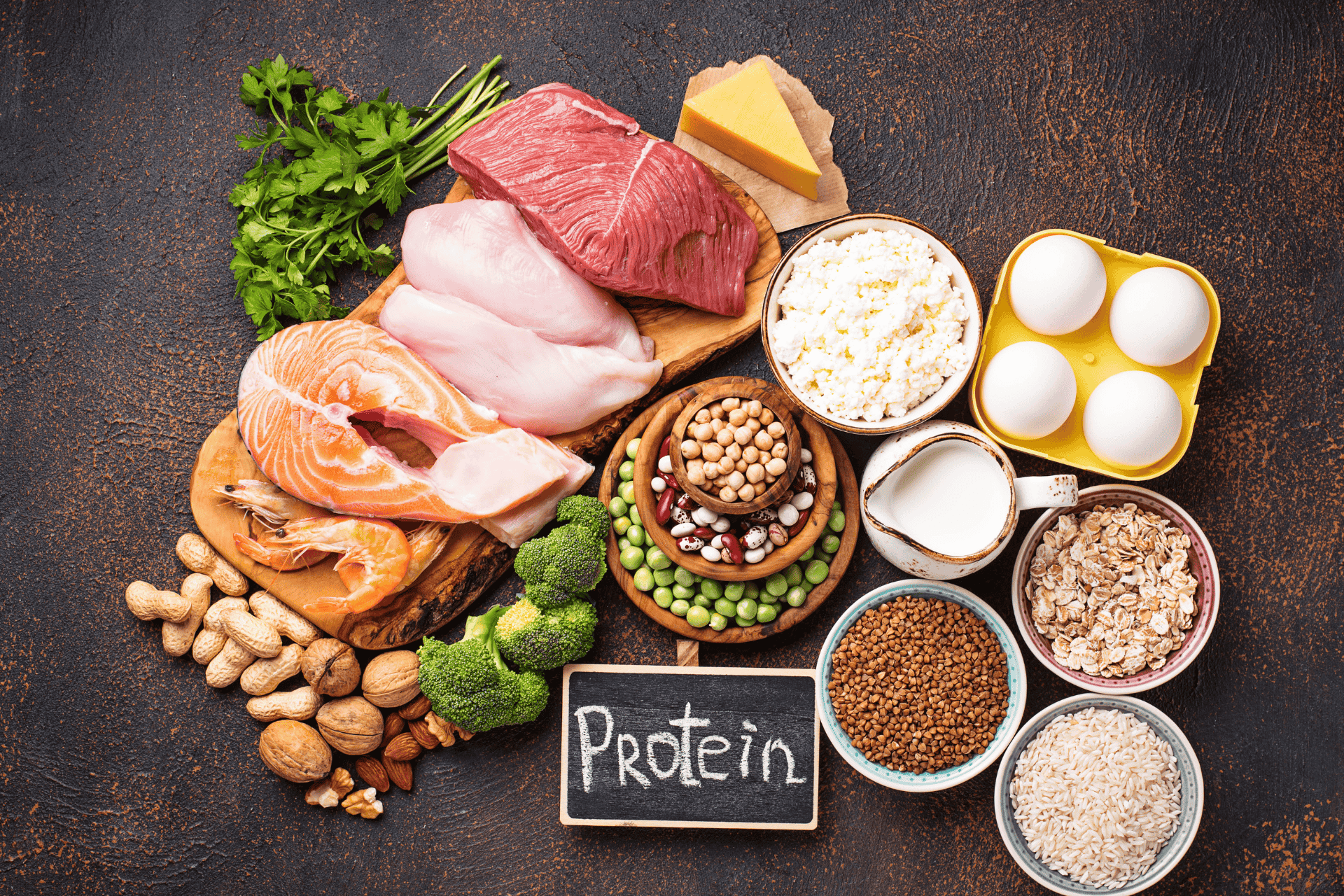High-Protein Diets for Weight Loss: Pros and Cons
Trying to lose weight often means changing what you eat. One popular way is to eat more protein. High-protein diets have become a favorite for many people looking to shed [...]
Read More
Medically reviewed by Alan Lucks | MD, Alan Lucks MDPC Private Practice - New York on November 15th, 2025.
Protein intake should reach 25-30% of daily calories (versus the standard 15-20%) to trigger weight loss benefits, with most people needing 1.2-1.6 grams per kilogram of body weight.
Higher protein consumption increases thermic effect of food by 20-30%, meaning your body burns more calories digesting protein compared to carbs (5-10%) or fats (0-5%).
Preserving muscle mass during weight loss requires adequate protein—studies show people lose 25% less muscle when consuming higher protein while in a caloric deficit.
Kidney strain concerns are largely unfounded for healthy individuals, but those with existing kidney disease should limit intake to 0.6-0.8 grams per kilogram body weight.
Digestive issues like constipation affect 10-15% of people on high-protein diets, typically resolved by increasing fiber to 25-35 grams daily and drinking an additional 8-16 ounces of water per day.
Trying to lose weight often means changing what you eat. One popular way is to eat more protein. High-protein diets have become a favorite for many people looking to shed pounds. But is this approach right for everyone? Let’s explore the good and the bad of high-protein diets, so you can decide if it fits your health goals.
A high-protein diet means eating more protein than usual. Protein comes from foods like meat, fish, eggs, dairy, beans, and nuts. People on these diets often get 25% to 30% or more of their daily calories from protein. This is higher than the typical diet, which usually has about 15% to 20% protein.
Protein is important because it helps build muscles, keeps you full, and supports many body functions. When you eat more protein, you might feel less hungry and eat fewer calories overall. That’s why many find it helpful for weight loss.
In addition to aiding in weight management, a high-protein diet can also enhance muscle recovery and growth, making it particularly popular among athletes and fitness enthusiasts. When you engage in physical activity, especially strength training, your muscles experience tiny tears that need to be repaired. Consuming adequate protein provides the essential amino acids necessary for this repair process, ultimately leading to increased muscle mass and strength over time. Moreover, protein has a higher thermic effect compared to fats and carbohydrates, meaning your body burns more calories digesting it, which can further support weight loss efforts.
A high-protein diet can have positive effects on metabolic health. Research indicates that increased protein intake can help regulate blood sugar levels and improve insulin sensitivity, which is particularly beneficial for those at risk of type 2 diabetes. Additionally, protein-rich foods often contain important nutrients like vitamins and minerals that contribute to overall health. For instance, lean meats and fish are excellent sources of B vitamins and omega-3 fatty acids, while legumes and nuts provide fiber and antioxidants, making a high-protein diet not just about the macronutrient itself, but also about the broader nutritional benefits it can offer.
 Benefits of High-Protein Diets for Weight Loss
Benefits of High-Protein Diets for Weight LossProtein takes longer to digest than carbs or fats. This means you stay full for a longer time after eating. Feeling full can stop you from snacking too much or overeating at meals. In addition to curbing hunger, a high-protein diet can also help stabilize blood sugar levels, which is crucial for managing cravings. When your blood sugar remains steady, you're less likely to experience the energy crashes that often lead to impulsive snacking on unhealthy foods.
When you lose weight, you want to lose fat, not muscle. Eating enough protein helps protect your muscles during weight loss. This is important because muscles burn more calories than fat, even when you rest. Moreover, maintaining muscle mass is essential for overall strength and mobility, especially as you age. Incorporating resistance training alongside a high-protein diet can further enhance muscle preservation, leading to a more toned physique and improved metabolic health.
Your body uses more energy to digest protein compared to fats or carbs. This is called the thermic effect of food. Eating more protein can slightly increase the number of calories your body burns each day. Additionally, a higher protein intake can lead to improved body composition over time, as it encourages fat loss while preserving lean muscle. This dual benefit not only supports weight loss goals but also contributes to a healthier, more efficient metabolism in the long run.
Starting a high-protein diet might raise questions about your health or nutrition needs. Using Doctronic.ai lets you get quick answers from an AI doctor anytime. You can also book affordable video visits with real doctors to discuss your diet and health goals. This accessibility to professional guidance can help you navigate challenges and stay motivated, making it easier to adhere to your dietary changes. With personalized advice, you can tailor your protein intake to fit your unique lifestyle and nutritional requirements, ensuring that you not only lose weight but do so in a healthy and sustainable manner.
Eating a lot of protein can be hard on your kidneys, especially if you already have kidney problems. Your kidneys work to filter waste from protein digestion, so too much protein might cause issues over time.
Focusing too much on protein might mean you eat fewer fruits, vegetables, and whole grains. These foods provide important vitamins, minerals, and fiber that keep your body healthy.
Some people experience constipation or an upset stomach when they increase protein without enough fiber or water. It’s important to balance your diet and stay hydrated.
High-protein diets can be hard to stick with long-term. Some find the food choices limited or miss their favorite carbs. A balanced approach that fits your lifestyle is key.
Chicken breast, turkey, and lean cuts of beef
Fish like salmon, tuna, and cod
Eggs and low-fat dairy products
Plant-based proteins such as beans, lentils, tofu, and nuts
Don’t forget to eat vegetables, fruits, and whole grains. These foods add fiber, vitamins, and minerals that support digestion and overall health.
Drinking enough water helps your kidneys process protein and prevents constipation.
Keep an eye on how your body feels. If you notice any problems, talk to a healthcare provider. You can easily get advice from Doctronic.ai, which offers quick AI answers and affordable doctor visits 24/7.
If you have kidney disease or reduced kidney function, a high-protein diet might not be safe. Always check with your doctor before making big changes.
Some health conditions, like liver disease or certain metabolic disorders, may require special diets. Consulting a healthcare professional is important.
If focusing on protein causes you to skip other important food groups, you might miss out on key nutrients. A balanced diet is usually better for long-term health.
Changing your diet can bring up many questions. Telehealth services like Doctronic.ai provide a convenient way to get medical advice without leaving home. You can ask about your diet, symptoms, or health concerns anytime. Plus, affordable video visits with licensed doctors are available 24/7 in all 50 states.
This kind of support helps you stay on track safely and get personalized care whenever you need it.
 Making the Right Choice for You
Making the Right Choice for YouHigh-protein diets can be a useful tool for weight loss. They help control hunger, protect muscle, and increase calorie burn. But they are not perfect for everyone. Consider your health, lifestyle, and preferences before starting. Balance protein with other nutrients and stay hydrated.
If you want guidance or have health questions, Doctronic.ai can provide fast, trustworthy help. Remember, the best diet is one that you can follow comfortably and safely over time.
Most healthy people can safely eat more protein, but those with kidney or liver problems should check with a doctor first.
Many weight loss plans suggest getting about 25% to 30% of your daily calories from protein, but individual needs vary.
Yes, eating more protein can help reduce appetite and calories, but combining a diet with exercise is best for health and lasting results.
Eating more protein than your body needs can add extra calories, which might lead to weight gain. Balance is important.
You can use telehealth services like Doctronic.ai for quick answers from AI or affordable video visits with doctors anytime.
High-protein diets can boost metabolism and preserve muscle during weight loss, but success depends on choosing lean sources and maintaining proper hydration and fiber intake. The approach works best when protein replaces refined carbs rather than adding extra calories to your existing diet. If you're experiencing digestive issues or want personalized guidance on protein targets, Doctronic can provide quick answers to optimize your approach.
Trying to lose weight often means changing what you eat. One popular way is to eat more protein. High-protein diets have become a favorite for many people looking to shed [...]
Read More